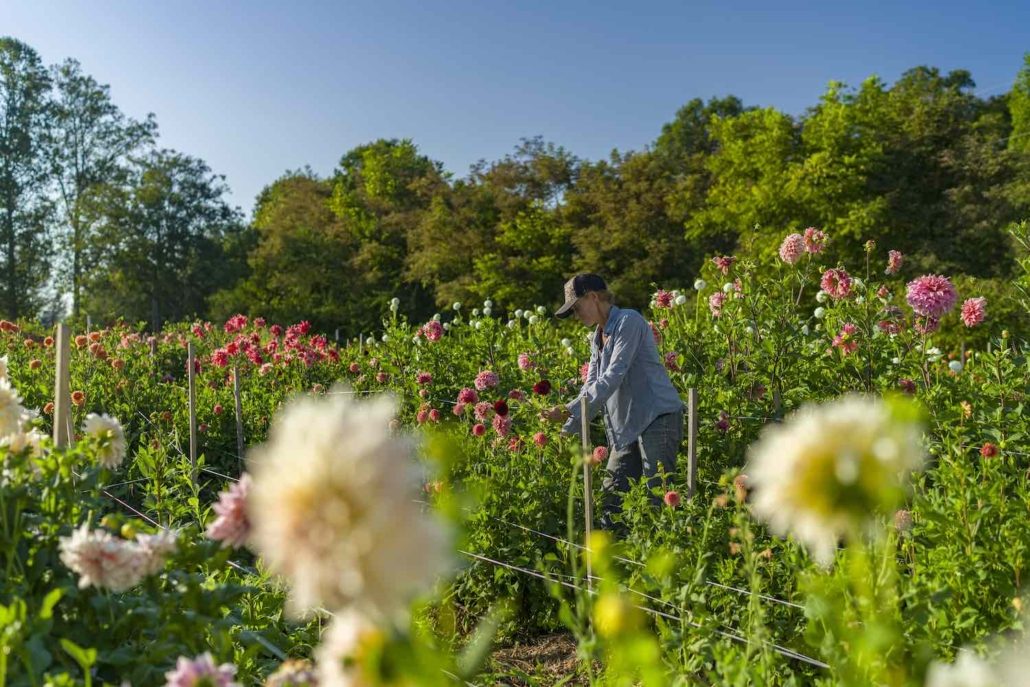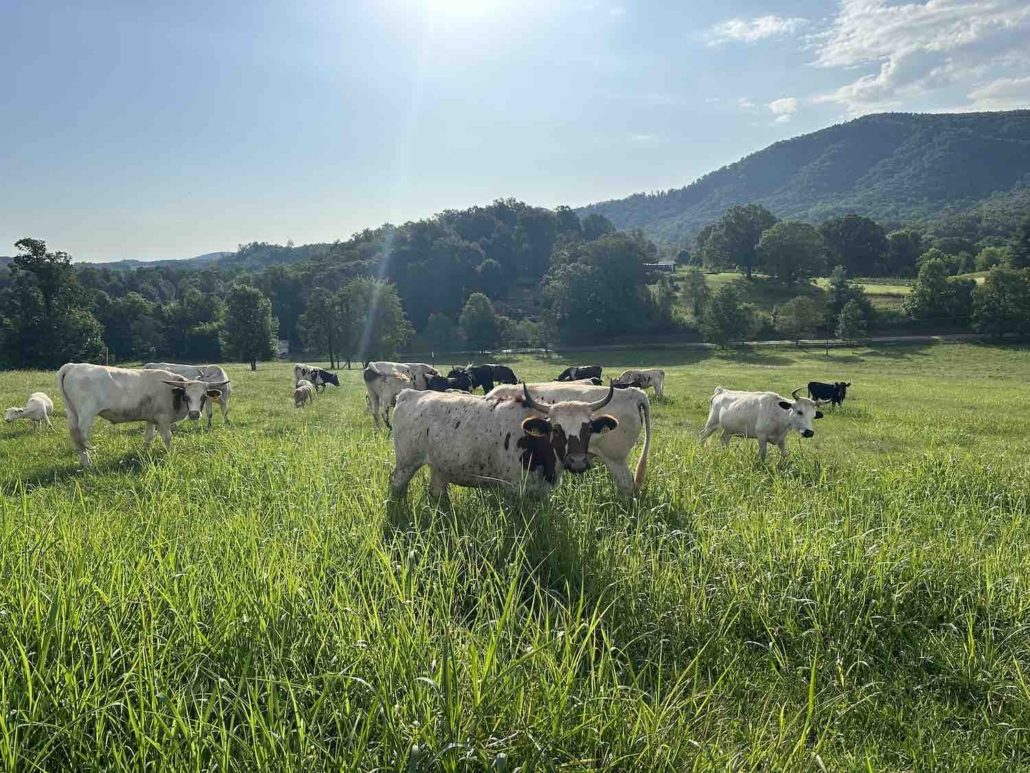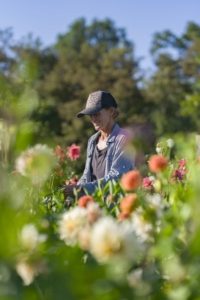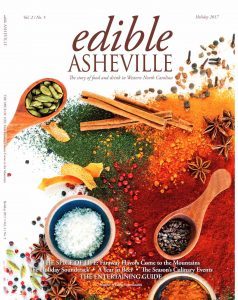COMMON GROUND
As WNC farmland disappears, growers and communities seek strategies to preserve land and access
BY GINA SMITH | PHOTOS BY NATE BURROWS
***
It’s a bright September afternoon, and Suzanne Nolter’s flower farm in rural northwest Buncombe County is radiant with color. Against the backdrop of green mountains and blue sky, rows of pink dahlias, sun-colored marigolds and tangles of jewel-like celosia paint a dreamlike scene.
Early fall is the season for weddings and events in Western North Carolina, and for Nolter’s farm business, Blazing Star Flowers, this means nonstop action. “You’re surrounded by flowers, but the work itself is still farm work,” she says.
But on top of the endless tasks of operating a farm and floral design business on her own, Nolter is engaged in another challenging undertaking: She’s looking for land.
“Unfortunately, the topography that makes this area gorgeous is also what makes it difficult to find a couple of growing acres,” Nolter says.
To be sure, as increasing development devours WNC’s precious farmland, the region’s young and beginning farmers are finding it tougher than ever to access the land they need to start or expand their businesses.
The good news is that several nonprofit groups and government agencies are acknowledging the struggle and taking steps to preserve the local farmland and make it easier to access. For their part, the growers themselves are leveraging their creativity and connections to find innovative solutions.

Suzanne Nolter of Blazing Star Flowers
GROWING A FARM
Nolter is a first-generation farmer with about 15 years of experience growing organic vegetables in New England. She moved to the Asheville area about four years ago and now farms a 1⁄2-acre plot, and runs it as Blazing Star Flowers, through participation in Southern Appalachian Highlands Conservancy’s Farm Incubator Program.
The goal of the Farm Incubator Program is to provide growers with affordable land, infrastructure and other resources for up to five years to help them establish their business while they seek a more permanent situation.
“We hope that farmers who graduate out of the program will be able to secure their own land or long-term leases and transition to successful continued production,” says SAHC Community Farm Manager Chris Link.
Along with farmland, the growers in the incubator program have access to much of the equipment they need to get on their feet: four greenhouses, multiple water wells, field irrigation, fencing, watering tanks, tractors, hand tools, a walk-in cooler, a value-added commercial kitchen, technical assistance and help with land and farm management. Plus, SAHC’s Farm Incubator is part of Farm Pathways, a partnership with Organic Growers School and the N.C. Cooperative Extension’s NC FarmLink that supports aspiring farmers with training, mentorship and land-access resources.
For Nolter, the SAHC Farm Incubator Program offers a stable starting point for her farm business. She even used the property’s commercial kitchen to develop an off-season business crafting handmade chocolate bars using her sustainably grown herbs and edible flowers.
But while the SAHC Farm Incubator provides a solid launch point for a handful of fledgling WNC farms, such programs are rare. Link is aware of only four in all of North Carolina, outside of less-structured lease arrangements offered by independent landowners. And even the programs that do exist are limited. The SAHC program typically receives up to 30 inquiries per year, but is able to welcome only about one new grower per year.
For Nolter, she has just two years left in the program, and she’s starting to prioritize the hunt for land. Aware of her business’s need for expensive infrastructure like hoop houses and walk-in coolers, and hoping to plant fields of perennial herbs and flowers that take years to establish, Nolter is reluctant to consider a lease situation that could potentially hold an element of uncertainty.
Ideally, Nolter would like to buy a 5-acre lot with about 2 acres of farmable land within easy driving distance of Asheville. And while constantly rising land prices are also daunting, she’s hopeful that within the next two years the market could shift in her favor. “I don’t go into it naively but I’m hopeful that, given some time, I might find something that could work.”
PROTECTING WITH POLICY
As development spreads across the state and pushes up land prices, North Carolina is now ranked second in the U.S. for projected agricultural land loss by 2040, according to the American Farmland Trust. And yet a 2022 survey by the Asheville-based Appalachian Sustainable Agriculture Project shows that nearly 60% of its member farmers either want or might want to buy or lease land for growing. In other words, the region’s farmers are increasingly seeking a dwindling asset: access to land.
In a study by the National Young Farmers Coalition, about 60% of farmers aged 40 and younger described finding affordable land as very or extremely challenging. Among farmers of color, the rate is nearly 70%.
With the average age of U.S. farmers steadily climbing—now at 57.5 years—it has become increasingly important to pave the way for young farmers to thrive. Which is part of the reason why state and local governments are now focusing their efforts to conserve agricultural land.
One key tool for government agencies is the use of Farmland Protection Plans. These plans can help put land in conservation easements, which protect it from development and can encourage conservation and agricultural uses. Between 2010 and 2022, the number of counties in North Carolina that had created Farmland Protection Plans jumped from 11 to 64, with nine of those counties being in Western North Carolina, according to the state’s agriculture department.
Interestingly, Buncombe County was the first county in North Carolina to create a Farmland Protection Plan, laying out its set of initiatives in 2007. Drawing on feedback from local farmers, it put forth a set of new policies, including one initiative that allows agricultural or forested land to be taxed at a lower value. Another part of the plan provided benefits to landowners who agree not to develop or use their property for non-farm activities for 10 years.
A 2020 revamp of Buncombe County’s plan recommends ongoing support for those existing policies, as well as increasing county funding to stimulate new farm enterprises and promote agricultural economic development.
Another part of Buncombe County’s plan involves an effort to help older farmers navigate succession planning. “A lot of times, that next generation isn’t tied to the land as closely, and sometimes they’re the ones selling it to a developer for the highest price,” says Ariel Zijp, farmland preservation manager for Buncombe County Soil & Water Conservation District.
Zijp, who is one of three trained farmland succession coordinators in Buncombe County among a handful in WNC, says the process involves working one on one with landowners and local land trusts, including SAHC, to establish conservation easements. Over the past couple of years, Buncombe County has significantly increased its budget for all types of conservation easements. And in 2022, county residents voted overwhelmingly to pass the $30 million Open Space Bond, which provides funding for, among other things, farmland conservation.
“With Buncombe County being a leader in the western part of the state, other counties can start replicating some of our efforts and maybe that’ll keep moving the message,” Zijp says.
BUILDING RELATIONSHIPS
Feeling locked out of opportunities to purchase their own land, many young farmers look to lease land from existing landowners, often crossing their fingers they can find a suitable, long-term arrangement.
NC FarmLink, a program of the N.C. Cooperative Extension, is a statewide database that connects these landless farmers with regional landowners who are either looking to lease their land or searching for workers to help with ongoing operations. Sometimes, the database can also connect buyers and sellers, and facilitate the transfer of farmland ownership.
NC FarmLink is like a “dating website for farm owners and land seekers,” says Zijp, who notes the usefulness of the database as a succession planning resource.
But, like dating in general, sometimes it’s not a good match. Stephen Bishop, who covers 45 counties as NC FarmLink’s western region director, says cultural and generational gaps can be a tricky challenge when connecting new farmers with landowners who are older.
“If you’re in a rural area and you’ve lived there your whole life, maybe you’ve never heard of organic or regenerative farming,” he says. “But the truth is, a lot of what these young farmers are trying to do, like small market gardens where they sell at the farmers market, there’s nothing new about that. They were doing that 50–60 years ago, and it was called truck farming. It’s just a different vocabulary.”
Bishop also notes that skill and experience levels vary with beginning farmers, making careful matchmaking crucial. “Somebody who’s just decided to farm and hasn’t worked a summer in 95° heat yet, they’re probably not going to be a good fit for a larger farm that needs someone with a lot of experience and qualifications to work it,” he says.
Aaron Bradley, a fifth-generation farmer who recently purchased the 74-acre regenerative beef, pork and poultry operation Colfax Creek Farm in Rutherford County, agrees that intentional relationship-building and open communication between older and aspiring growers are key to ensuring that tools like succession planning and conservation easements succeed. A mentor over the past few years for many aspiring farmers, Bradley says that leading up to the purchase of his farm in 2018, he and his wife, Nicole, spent a lot of time “tracking down land – owners, talking with people, getting insight from longtime farmers.”
Bradley also volunteered on various farms over several years while working full time as a fire lieutenant. “Young people need to find a farm, even if it’s not the type of farm they want to work on now, and just prove themselves, develop a reputation, learn and put themselves in a position that they can be thought of [by older farmers doing succession planning] when the time comes,” he says.

Crow Fly Farms in Marion, NC
GETTING CREATIVE
Even with the introduction of state and local programs to preserve farmland and make it easier to access, young growers have to get creative. In addition to considering land leases, they also develop collaborative arrangements with other young farmers and work with existing landowners to swap their services for use of the land. Then, when they’re in a position to purchase property, they’re putting together a patchwork of federal loans and grants to help finance the buy.
First-generation farmer Jake Puckett, for example, owner and operator of Crow Fly Farms, both owns and leases land in McDowell County, and has found ways to both save money and secure diverse funding sources for his operation.
With a small nest egg from the sale of a home in Colorado, he and his partner, Luna Mikos, found themselves completely priced out of property sales in Buncombe and Haywood counties when they began searching for farmland about four years ago. Eventually, Puckett and his partner bought 80 acres near Marion— an area that was, at the time, slightly more affordable—for their regenerative cattle, hog and sheep operation. He accessed loans through the U.S. Department of Agriculture and a Virgin – ia-based nonprofit named FoodShed Capital, as well as grants through the National Resources Conservation Services program.
But with only about 20 of those acres currently suitable for grazing, he has also leased additional parcels of land to expand his busi – ness. Rather than exchange money with the landowners, Puckett, who is accredited in holistic land management through the Savory Institute, is providing free services to improve the property’s environmental health with re – generative agriculture techniques. “Because we’re using really good land-management practices, we’ve been able to secure our leases at no charge,” he says. “We’re basically maintaining the land for the landowners, and we’re improving it through our management.”
Puckett also had a successful run farming collaboratively for a time, leasing some of his land and infrastructure at an affordable rate to first-generation farmers Dana and Jordan Choquette (see “Losing Ground,” Fall 2023 issue, Edible Asheville) while they searched for a permanent home for their regenerative beef, pork and poultry farm, Old North Acres. Puckett found this arrangement to be mutually beneficial to both parties, bringing in some income for him and providing land and resources to new farmers.
With many up-and-coming growers interested in finding new ways to collaborate and share resources and knowledge, he envisions some kind of support group for young farmers as one possible solution. “I don’t really know what the answer is,” he says. “Finding a way to get usable farmland into the hands of these people who want to farm is critical, or it’s just going to continue to disappear and we’ll have nothing but little mansions speckled across North Carolina.”
Save
Save
Save
Save
Save
Save
Save
Save
Save
Save

Suzanne Nolter of Blazing Star Flowers
THE WEEKLY REVEL
Sign up for your free handpicked guide to enjoying life around Asheville.
Available weekly from May to October.





